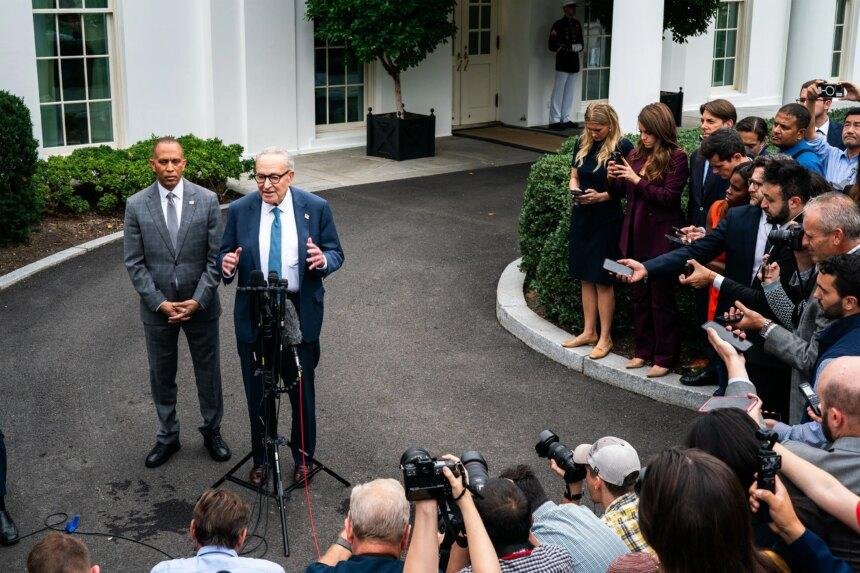Government Shutdown Sparks Urgent Debate Over Healthcare Subsidies
As the federal government faces a shutdown, the implications for millions of Americans, particularly Hispanic voters, are becoming increasingly urgent. Julio Fuentes, president of the Florida State Hispanic Chamber of Commerce, recently stood just steps away from the U.S. Capitol, emphasizing the critical need for Congress to act swiftly to maintain affordable healthcare coverage. His message was clear: the healthcare subsidies established under the Affordable Care Act (ACA) are at risk, and so are the votes of the Hispanic community that played a pivotal role in the Republican Party’s electoral success last year.
The Stakes for Hispanic Voters
Fuentes highlighted that approximately 4.7 million Floridians rely on ACA coverage, which has been significantly bolstered by federal subsidies. “Hispanic voters helped bring Donald Trump back to the White House,” he stated, urging Republican leaders to prioritize accessible healthcare. As the 2024 elections approach, he warned that voters will remember how their healthcare needs are addressed-or ignored.
The current political landscape is fraught with tension as Democrats in Congress have stalled government funding to pressure Republicans into extending these crucial subsidies. The stakes are high, with millions of Americans, including those covered through employer plans and Medicare, bracing for potential increases in healthcare costs.
A Political Tug-of-War
The ongoing standoff has become a focal point for Democrats, who see it as an opportunity to advocate for accessible healthcare. With the open enrollment period for ACA plans approaching, the urgency is palpable. If the subsidies expire, experts predict that the average monthly premium for beneficiaries could double, leading to a significant drop in coverage as healthier individuals opt out due to rising costs.
Hakeem Jeffries, the House Minority Leader, voiced concerns on the Capitol steps, stating, “In the coming days, over 20 million Americans will see drastic increases in their premiums, copays, and deductibles due to Republicans’ refusal to extend ACA subsidies.” This sentiment reflects a broader Democratic strategy to frame the government shutdown as a healthcare crisis.
The Open Enrollment Dilemma
Open enrollment for ACA plans begins on November 1, and insurance companies are preparing to send out notices regarding next year’s premiums. However, many are delaying these communications, awaiting clarity from Washington. For instance, Covered California, the state’s insurance marketplace, plans to issue premium notices later than usual, on October 15, due to the uncertainty surrounding federal funding.
Individuals like Natalie Tyer, a 31-year-old resident of Richmond, Virginia, are anxiously monitoring the situation. Tyer has relied on ACA coverage for over a year, benefiting from subsidies that reduce her monthly premium from $308 to just $53. If these subsidies were to expire, she fears she might have to forgo health insurance altogether. “I would have to rely on hope,” she lamented.
The Broader Implications of the Shutdown
While the Democrats aim to spotlight healthcare costs, the government shutdown brings a host of other challenges. Federal employees face unpaid salaries, public health agency functions are disrupted, and essential services, such as food assistance for low-income mothers, are at risk. The ACA has been a contentious issue since its inception in 2010, with Republicans consistently opposing its implementation. The current conflict echoes past government shutdowns, notably in 2013 and 2017, when Republicans attempted to dismantle the ACA.
The current debate centers on the billions in subsidies that were temporarily expanded during the COVID-19 pandemic to increase ACA enrollment. Ironically, the same Democrats who championed these benefits scheduled their expiration for the end of this year. Some Republicans have cautioned that allowing these subsidies to lapse could have dire electoral consequences.
Public Sentiment and Political Calculations
Recent polling data reveals that a significant majority of Americans-over 75%-support the continuation of ACA subsidies. Many voters express a willingness to hold Trump and the Republican Party accountable if these subsidies are cut. However, a CBS News survey indicates that only a quarter of the population believes that the Democratic push for subsidy extension justifies the government shutdown.
Republican leaders have countered the Democrats’ narrative, suggesting that the latter are manufacturing a political crisis. House Speaker Mike Johnson accused Democrats of using healthcare as a bargaining chip, asserting that the issue of subsidies should be addressed separately from the government funding debate.
The Future of Healthcare Policy
As the open enrollment period approaches, insurance companies are poised to announce premium prices, which will be influenced by the ongoing negotiations in Congress. Democrats argue that delaying a resolution could lead to widespread confusion among consumers.
William Pierce, a health policy consultant, emphasized the importance of healthcare as a central issue for Democrats. “Everything revolves around healthcare. They need to keep this conversation alive,” he stated, noting that it represents a vulnerability for Republicans.
In the midst of this political turmoil, misinformation has also surfaced. Republican leaders have claimed that Democrats are seeking to expand healthcare access to undocumented immigrants, a narrative that lacks factual basis. In reality, undocumented individuals are ineligible for ACA coverage, and Democrats have not proposed any changes to this policy.
Conclusion
As the government shutdown continues, the debate over healthcare subsidies remains a critical issue for millions of Americans. The outcome of this standoff will not only affect the immediate healthcare landscape but also shape the political dynamics leading into the 2024 elections. With both parties vying for public support, the stakes have never been higher. As individuals like Natalie Tyer anxiously await news about their healthcare coverage, the broader implications of this political battle will resonate far beyond the halls of Congress.











